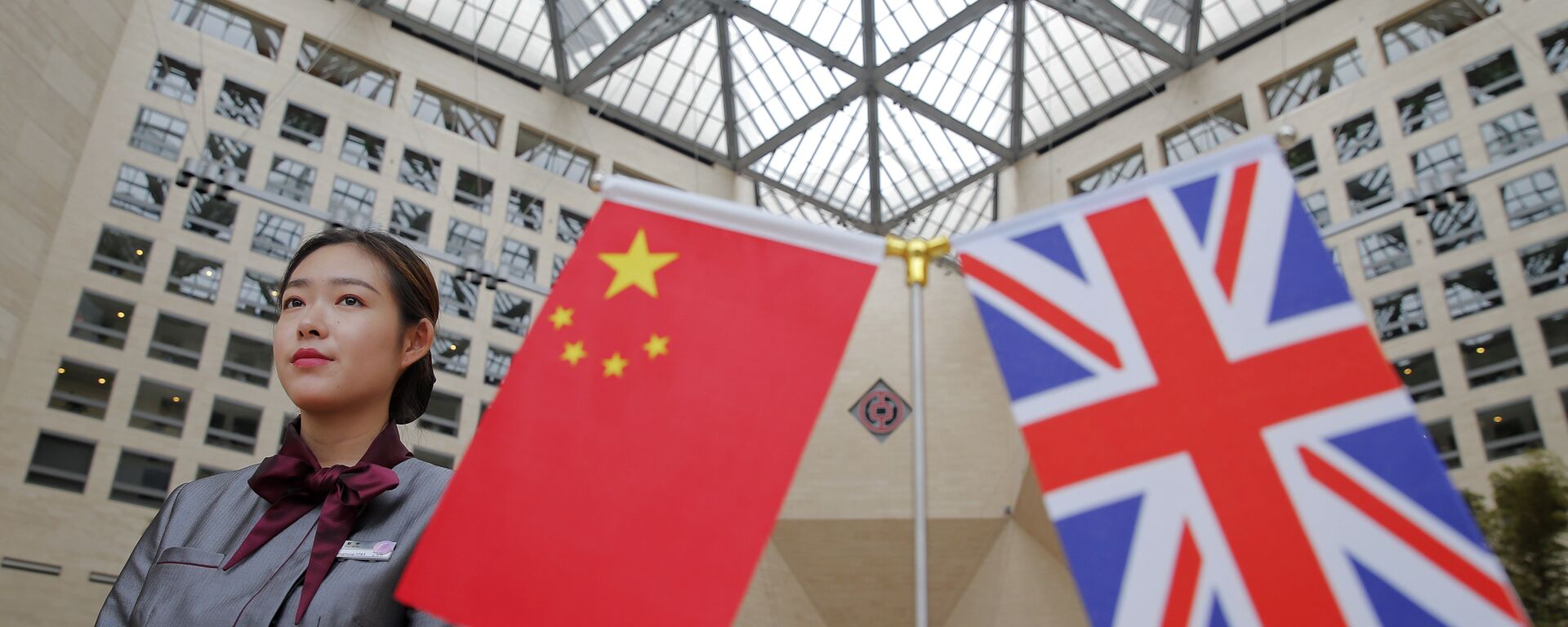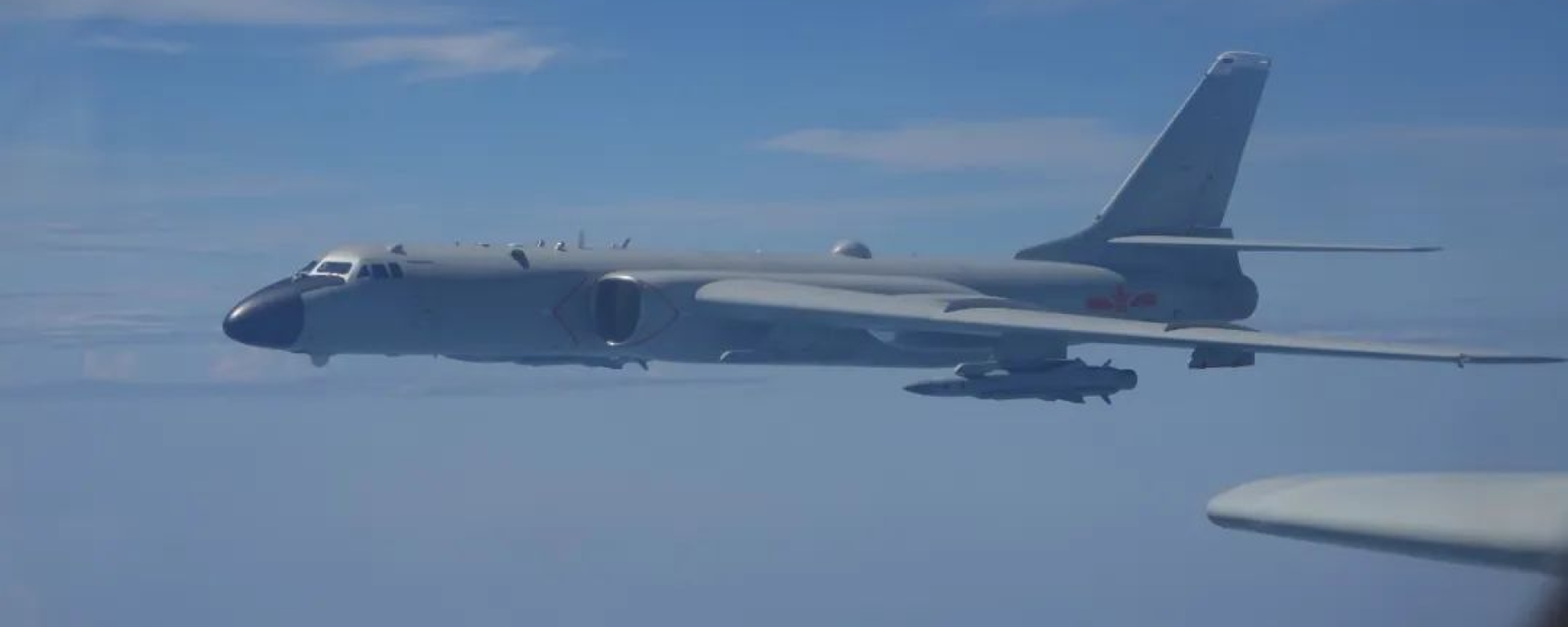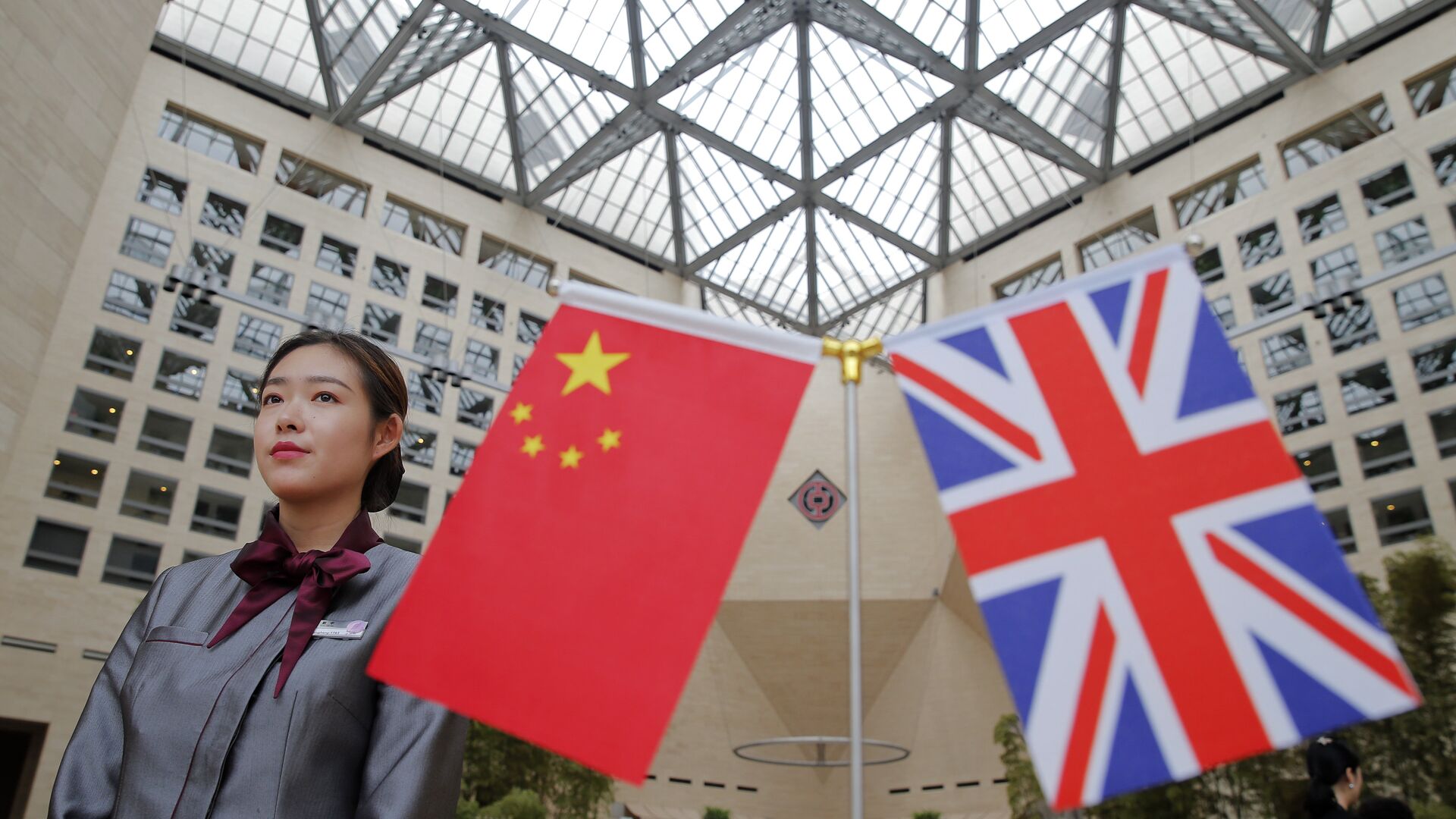https://sputnikglobe.com/20221117/analysts-uk-abandons-strategic-autonomy-by-joining-semiconductor-blockade-of-china-1104333854.html
Analysts: UK Abandons Strategic Autonomy by Joining 'Semiconductor Blockade' of China
Analysts: UK Abandons Strategic Autonomy by Joining 'Semiconductor Blockade' of China
Sputnik International
Rishi Sunak’s Cabinet is provoking tensions in business relations with China, as the West fears a new technological breakthrough by Beijing. A Sino-British... 17.11.2022, Sputnik International
2022-11-17T16:21+0000
2022-11-17T16:21+0000
2023-05-28T15:25+0000
world
china
bilateral relations
united kingdom (uk)
https://cdn1.img.sputnikglobe.com/img/104409/39/1044093966_0:108:3600:2133_1920x0_80_0_0_76774ce1323e4e0b02d8867dfd19c343.jpg
Nexperia, a global semiconductor company, must sell at least 86 percent of Newport Wafer Fab under the UK National Security and Investment Act. This was announced on Wednesday by Secretary of State for Business, Energy and Industrial Strategy Grant Shapps. Nexperia is registered in the Netherlands and was bought completely by Chinese electronics maker Wingtech in 2019. Newport Wafer Fab owns the UK's largest microchip manufacturing facility. Nexperia initially owned 14% of Newport Wafer Fab, but in July 2021 it upped its stake to 100%, acquiring additional 86%There were calls in the UK Parliament about the inadmissibility of Nexperia taking over semiconductor production even before the full takeover of Newport Wafer Fab by Nexperia. For its part, the US had reportedly been pressing London through diplomatic channels to renegotiate the deal.A few days before the UK revoked Nexperia's right to own the British microchip maker, Prime Minister Rishi Sunak said that China represented a "systemic challenge to the values and interests" of the United Kingdom and also threatened British "economic security."The British national strategy is closely intertwined with US policy, so it completely lacks its own strategic autonomy, Ding Donghan, a researcher at the Center for British Studies at the Shanghai International Studies University, told Sputnik, commenting on the Sunak government's decision:The Sunak government's decision is likely to provoke a further deterioration of the business climate in the British market for Chinese companies. The decision reflected a downward trend in the development of Sino-British relations and, at the same time, fit into the technological blockade of China being promoted by the West. In mid-October, US companies were banned from exporting advanced chips and manufacturing equipment to China. Restrictions also affected exports to China of this product, manufactured by Western companies using US technology.After that, the German government, even despite the generally successful Sino-German summit in Beijing, denied the sale of the factory belonging to the German company Elmos, which produces microchips, to Silex Microsystems AB. This is a subsidiary of the Chinese Sai Group.The West is imposing a "semiconductor" blockade on China, fearing the country's growing position in the global technology market, Mikhail Belyaev, a Russian political scientist and expert on UK-China relations, told Sputnik:London announced that the Chinese company had been stripped of its right to own the British microchip manufacturer on the same day that the Sino-British meeting in Bali was canceled. The cancellation of the meeting was officially explained by changes in the schedule of G20 events. However, expert Mikhail Belyaev believes that the meeting would have taken place regardless of the “weather,” had China been confident that it would have had the desired effect:Ding Donghan's view echoed in many respects that of the Russian political analyst:The British side insisted on a meeting with the Chinese leader. After it was axed, the Chinese media did not rule out the possibility that this was Beijing's way of expressing its strong dissatisfaction with the British position on Taiwan, including the recent visit of Minister of State at the Department for International Trade Greg Hands to the island, which Beijing regards as inalienable part of its territory.
https://sputnikglobe.com/20221116/sunak-softens-truss-china-stance-dubs-beijing-systemic-challenge-1104275176.html
https://sputnikglobe.com/20220810/uk-foreign-secretary-summons-chinese-ambassador-over-taiwan-escalation-1099450032.html
china
united kingdom (uk)
Sputnik International
feedback@sputniknews.com
+74956456601
MIA „Rossiya Segodnya“
2022
Sputnik International
feedback@sputniknews.com
+74956456601
MIA „Rossiya Segodnya“
News
en_EN
Sputnik International
feedback@sputniknews.com
+74956456601
MIA „Rossiya Segodnya“
Sputnik International
feedback@sputniknews.com
+74956456601
MIA „Rossiya Segodnya“
uk, blockade, china, relations
uk, blockade, china, relations
Analysts: UK Abandons Strategic Autonomy by Joining 'Semiconductor Blockade' of China
16:21 GMT 17.11.2022 (Updated: 15:25 GMT 28.05.2023) Rishi Sunak’s Cabinet is provoking tensions in business relations with China, as the West fears a new technological breakthrough by Beijing. A Sino-British meeting in Bali did not take place, perhaps due to a lack of confidence in a positive outcome.
Nexperia, a global semiconductor company, must sell at least 86 percent of Newport Wafer Fab under the UK National Security and Investment Act. This was announced on Wednesday by Secretary of State for Business, Energy and Industrial Strategy Grant Shapps. Nexperia is registered in the Netherlands and was bought completely by Chinese electronics maker Wingtech in 2019. Newport Wafer Fab owns the UK's largest microchip manufacturing facility. Nexperia initially owned 14% of Newport Wafer Fab, but in July 2021 it upped its stake to 100%, acquiring additional 86%
There were calls in the UK Parliament about the inadmissibility of Nexperia taking over semiconductor production even before the full takeover of Newport Wafer Fab by Nexperia. For its part, the US had reportedly been pressing London through diplomatic channels to renegotiate the deal.
A few days before the UK revoked Nexperia's right to own the British microchip maker, Prime Minister Rishi Sunak said that
China represented a "systemic challenge to the values and interests" of the United Kingdom and also threatened British "economic security."

16 November 2022, 10:16 GMT
The British national strategy is closely intertwined with US policy, so it completely lacks its own strategic autonomy, Ding Donghan, a researcher at the Center for British Studies at the Shanghai International Studies University, told Sputnik, commenting on the Sunak government's decision:
“The countries of the Five Eyes partnership are doing their best to implement their strategy of suppressing China. This is especially true in the field of semiconductors. However, they can only slow down the pace of Chinese technological breakthroughs in this area, but in the end China is bound to succeed. The UK has now completely abandoned its own strategic autonomy. It closely follows the US in everything and refuses to have a pragmatic relationship with China. Especially since, just as Liz Truss did, Rishi Sunak is likely to be a weak prime minister, and we cannot hope for a British policy independent of Washington.”
The Sunak government's decision is likely to provoke a further deterioration of the business climate in the British market for Chinese companies. The decision reflected a downward trend in the development of Sino-British relations and, at the same time, fit into the technological blockade of China being promoted by the West. In mid-October, US companies were banned from exporting advanced chips and manufacturing equipment to China. Restrictions also affected exports to
China of this product, manufactured by Western companies using US technology.

10 August 2022, 12:47 GMT
After that, the German government, even despite the generally successful Sino-German summit in Beijing, denied the sale of the factory belonging to the German company Elmos, which produces microchips, to Silex Microsystems AB. This is a subsidiary of the Chinese Sai Group.
The West is imposing a "semiconductor" blockade on China, fearing the country's growing position in the global technology market, Mikhail Belyaev, a Russian political scientist and expert on UK-China relations, told Sputnik:
“What scares the West the most is not even the fact that it (China) borrows their technology and then floods the market with its products. Even more worrying for the West is the fact that China has taken over the technological initiative and has become the leading manufacturer, not only quantitatively but also qualitatively dominating the semiconductor market. This, in turn, is closely related to the strengthening of China's military capabilities. The West is afraid and trying to prevent this from happening in every way possible, and is cutting it off by all means at its disposal, including the 'semiconductor blockade,'” he said.
London announced that the Chinese company had been stripped of its right to own the British microchip manufacturer on the same day that the Sino-British meeting in Bali was canceled. The cancellation of the meeting was officially explained by changes in the schedule of G20 events. However, expert Mikhail Belyaev believes that the meeting would have taken place regardless of the “weather,” had China been confident that it would have had the desired effect:
“International meetings between the leaders of the two countries are organized if there is a subject for dialog. And if it is clear that the meeting can lead to some outcome that promotes bilateral relations, then it is held in ‘any weather.’ The cancellation of the meeting indicates that the leaders of China and Great Britain had no special subject to talk about. Obviously, the Chinese side did not expect a constructive exchange of views and a positive outcome. The lack of substantial grounds and preconditions for the topics of interest to be raised at the meeting, that there would be a positive outcome, was most likely the real reason for the cancellation of the meeting.”
Ding Donghan's view echoed in many respects that of the Russian political analyst:
“Sunak's meeting with President Xi Jinping was canceled because it couldn't have any impact on Sino-British relations in the current situation. Within the framework of the Five Eyes alliance, Britain has little autonomy left to build relations with China.”
The British side insisted on a meeting with the Chinese leader. After it was axed, the Chinese media did not rule out the possibility that this was Beijing's way of expressing its strong
dissatisfaction with the British position on Taiwan, including the recent visit of Minister of State at the Department for International Trade Greg Hands to the island, which Beijing regards as inalienable part of its territory.




